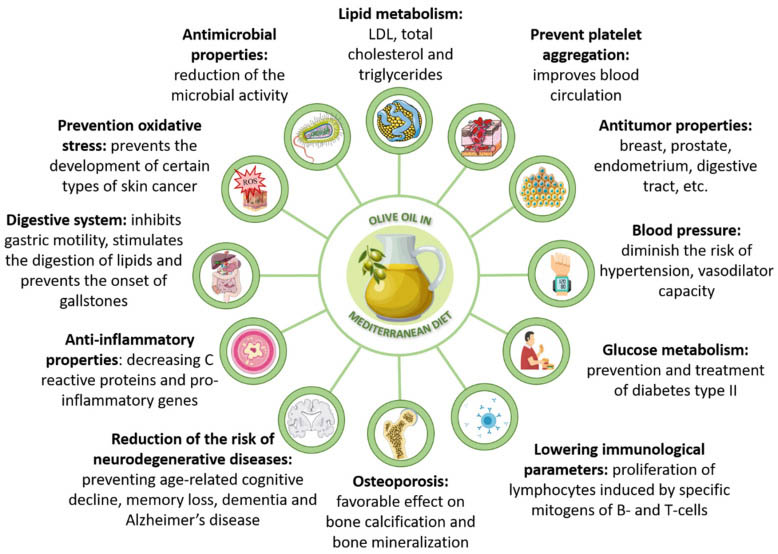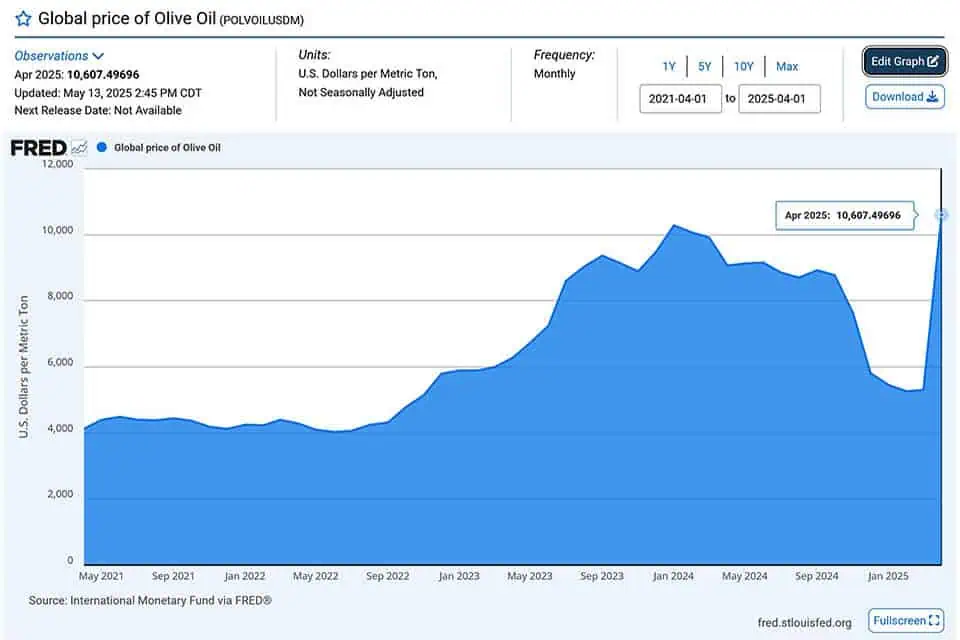The benefits of Extra Virgin Olive Oil
Extra Virgin Olive Oil: the Benefits on Human Health
1 – Protects Heart’s Health
Studies have found that high monounsaturated fat diets lower LDL cholesterol, raise HDL cholesterol and lower triglycerides better than lower-fat, higher-carb diets do. Thanks to powerful antioxidants known as polyphenols, extra virgin oil is considered an anti-inflammatory food and cardiovascular protector. When someone’s immune system essentially begins to fight her own body as a result of a poor diet, stress or other factors, inflammatory responses are triggered that lead to dangerous, disease-causing inflammation.
The purpose of inflammation is to protect us against illnesses and repair the body when needed, but chronic inflammation is extremely harmful to arterial health and linked to heart disease, autoimmune diseases and more. Extra virgin olive oil helps reverse inflammatory along with age – and disease – related changes to the heart and blood vessels, according to a 2009 study published in the Journal of Cardiovascular Pharmacology. Research shows olive oil is beneficial for lowering hypertension because it makes nitric oxide more bioavailable, which keeps arteries dilated and clear.
The protective effects of a Mediterranean-style diet rich in alpha-linolenic acid (ALA) from olive oil have been shown in many studies, with some finding that this type of higher-fat diet is capable of decreasing the risk of cardiac death by 30 percent and sudden cardiac death by 45 percent!
2 – Helps Fight Cancer
According to a 2004 study published in the European Journal of Cancer Prevention, olives and olive oil contain antioxidants in abundance. They are some of the best high antioxidant foods. Olives (especially those that have not been subjected to high-heat processes) contain acteosides, hydroxytyrosol, tyrosol and phenyl propionic acids. Both olives and olive oil contain substantial amounts of other compounds deemed to be anticancer agents (e.g., squalene and terpenoids) as well as the peroxidation-resistant lipid oleic acid.
Researchers feel that it’s probable that high olive and olive oil consumption in southern Europe represents an important contribution to the beneficial effects of cancer prevention and health in the Mediterranean Diet.
3 – Helps with Weight Loss and Obesity Prevention
Eating plenty of healthy fats is a key element in controlling excess insulin, a hormone that controls blood sugar levels, makes us gain weight, and keeps the weight packed on despite us cutting calories and exercising more. Fats are satiating and help reduce hunger, cravings and overeating. This is one reason why numerous studies have found that diets low in fat don’t result in weight loss or weight maintenance as easily or often as balanced, higher-fat diets do.
After reviewing five trials including a total of 447 individuals, researchers from University Hospital Basel in Switzerland found that individuals assigned to higher-fat, low-carbohydrate diets lost more weight than individuals randomized to low-fat diets. There were no differences in blood pressure levels between the two groups, but triglyceride and high-density lipoprotein cholesterol values changed more favorably in individuals assigned to the diets higher in fat!
Because diets with ample amounts of healthy fats are more satisfying, people are much more likely to be able to stick with them. A 2002 study published in the Women’s Health Journal, for example, found that an olive oil-enriched diet brought about greater weight loss than a lower-fat diet in an eight-week comparison. Following the eight weeks, the participants also overwhelmingly chose the olive oil-enriched diet for at least six months of the follow-up period.
4 – Supports Brain Health
The brain is largely made up of fatty acids, and we require a moderately high level on a daily basis to perform tasks, regulate our moods and think clearly. Like other sources of healthy fats, olive oil is considered a brain food that improves focus and memory.
Olive oil helps fight age-related cognitive decline because it protects against inflammation, oxidative stress and ADDLs, proteins that are toxic to the brain that can trigger dementia or Alzheimer’s disease.
5 – Fights Mood Disorders and Depression
Healthy fats, including olive oil, have hormone-balancing, anti-inflammatory effects that can prevent neurotransmitter dysfunction. Low-fat diets are often linked to higher rates of depression and anxiety. Mood or cognitive disorders can occur when the brain doesn’t get a sufficient amount of “happy hormones” like serotonin or dopamine, important chemical messengers that are necessary for mood regulation, getting good sleep and thought-processing.
One 2011 study conducted by the University of Las Palmas in Spain found that monounsaturated and polyunsaturated fat intake had an inverse relationship with depression risk. At the same time, trans-fat intake and depression risk had a linear relationship, showing that higher trans-fat consumption and lower PUFA and MUFA could up the chances of battling mood disorders and treating depression.
6 – Great for Boosting Skin Health
As a high source of vitamin E and other antioxidants, olive oil can also help hydrate skin, speed up wound healing, and help fight infections or hormonal imbalances that can lead to acne, eczema and other skin conditions, making extra virgin olive oil a home remedy for acne and natural eczema treatment.
7 – Can Help, Prevent, or Treat Diabetes
While carbohydrates elevate blood sugar by providing glucose, fats help stabilize blood sugar levels and regulate insulin. Even when you eat something high in sugar or carbs, adding extra virgin olive oil to the meal can help slow down the impact on your bloodstream. Consuming olive oil is also a great way to feel more satisfied after meals, which can help prevent sugar cravings and overeating that can lead to diabetes complications.
8 – Helps Balance Hormones
When trying to balance your hormones and reduce symptoms related to PMS, infertility or menopause, it’s important for your diet to include plenty of nutrients and healthy fats. Olive oil supplies essential fats that can help regulate thyroid, adrenal and pituitary glands. These all work together to produce and balance sex hormones. Olive oil also provides essential vitamin E benefits that help regulate estrogen production.

EVOO Components and their Health Benefits
Thanks to its status as a spotlight food in the Mediterranean Diet, and thanks to extensive research on its unique phytonutrient composition, olive oil has become a legendary culinary oil with very difficult-to-match health benefits. Among its extensive list of phytonutrients, no single category of nutrients is more important than its polyphenols. The polyphenol content of this delicious oil is truly amazing! The list below shows some of the key polyphenols found in olive oil, organized by their chemical category:
| Simple Phenols | Anthocyanidins | |
| • tyrosol | • cyanidins | |
| • hydroxytyrosol | • peonidins | |
| Terpenes | Flavonols | |
| • oleuropein | • quercetin | |
| • ligstroside | • kaempferol | |
| Flavones | Flavonoid Glycosides | |
| • apigenin | • rutin | |
| • luteolin | Lignans | |
| Hydroxycinnamic acids | • pinoresinol | |
| • caffeic acid | Hydroxybenzoic Acids | |
| • cinnamic acid | • vanillic acid | |
| • ferulic acid | • syringic acid | |
| • coumaric acid |
Most of the polyphenols in this list have been shown to function both as antioxidants and also as anti-inflammatory nutrients in the body. The very number and variety of polyphenols in olive oil helps explain the unique health benefits of this culinary oil.
Anti-Inflammatory Benefits
It’s unusual to think about a culinary oil as an anti-inflammatory food. Plant oils are nearly 100% fat, and in a general dietary sense, they are typically classified as “added fats.” Intake of too much added dietary fat can be a problem for many reasons— including reasons involving unwanted inflammation. So it’s pretty remarkable to find a culinary oil that’s repeatedly been shown to have anti-inflammatory properties and provide health benefits in the area of unwanted inflammation. Yet that’s exactly the research track record that describes extra virgin olive oil.
The anti-inflammatory strength of olive oil rests on its polyphenols. These anti-inflammatory compounds include at least nine different categories of polyphenols and more than two dozen well-researched anti-inflammatory nutrients. Research has documented a wide variety of anti-inflammatory mechanisms used by olive oil polyphenols to lower our risk of inflammatory problems. These mechanisms include decreased production of messaging molecules that would otherwise increase inflammation (including TNF-alpha, interleukin 1-beta, thromboxane B2, and leukotriene B4); inhibition of pro-inflammatory enzymes like cyclo-oxygenase 1 and cyclo-oxygenase 2; and decreased synthesis of the enzyme inducible nitric oxide synthase. In heart patients, olive oil and its polyphenols have also been determined to lower blood levels of C-reactive protein (CRP), a widely used blood measurement for assessing the likelihood of unwanted inflammation. They have also been found to reduce activity in a metabolic pathway called the arachidonic acid pathway, which is central for mobilizing inflammatory processes. These anti-inflammatory benefits of extra virgin olive oil do not depend on large levels of intake. As little as 1-2 tablespoons of extra virgin olive oil per day have been shown to be associated with significant anti-inflammatory benefits.
Cardiovascular Benefits
Many different cardiovascular problems—including gradual blocking of the arteries and blood vessels (called atherosclerosis)—have their origin in two unwanted circumstances. The first of these circumstances is called oxidative stress. Oxidative stress means too much damage (or risk of damage) from the presence of overly reactive oxygen-containing molecules. One of the best ways to help avoid oxidative stress is to consume a diet that is rich in antioxidant nutrients. The second of these circumstances is ongoing (chronic) and undesirable low-level inflammation. Undesirable and chronic inflammation can result from a variety of factors, including unbalanced metabolism, unbalanced lifestyle, unwanted exposure to environmental contaminants, and other factors. One of the best ways to help avoid chronic and unwanted inflammation is to consume a diet that is rich in anti-inflammatory nutrients. Any food that is rich in antioxidant and anti-inflammatory nutrients is a natural candidate for lowering our risk of heart problems, because it contains the exactly right combination of nutrients to lower our risk of oxidative stress and chronic, unwanted inflammation. Many foods contain valuable amounts of antioxidants and anti-inflammatory compounds, but few foods are as rich in these compounds as extra virgin olive oil, and this fact alone accounts for many of the research-based benefits of this culinary oil for health of our cardiovascular system.
In terms of antioxidant protection for our blood vessels, olive oil has been shown to lower risk of lipid peroxidation (oxygen damage to fat) in our bloodstream. Many of the fat-containing molecules in our blood—including molecules like LDL—need to be protected from oxygen damage. Oxygen damage to molecules like LDL significantly increases our risk of numerous cardiovascular diseases, including atherosclerosis. Protection of the LDL molecules in our blood from oxygen damage is a major benefit provided by olive oil and its polyphenols. Equally important is protection against oxygen damage to the cells that line our blood vessels. Once again, it’s the polyphenols in olive oil that have been shown to provide us with that protection.
One process we don’t want to see in our blood vessels is too much clumping together of blood cells called platelets. While we want to see blood platelets clump together under circumstances like an open wound, where their clumping together acts to seal off the wound, we don’t want this process to occur in an ongoing way when there is no acute emergency. Several of the polyphenols found in olive oil—including hydroxytyrosol, oleuropein and luteolin—appear to be especially helpful in keeping our blood platelets in check and avoiding problems of too much clumping (called platelet aggregation). There are also two messaging molecules (called plasminogen activator inhibitor-1 and factor VII) that are capable of triggering too much clumping together of the platelets, and the polyphenols in olive oil can help stop overproduction of these molecules.
Olive oil is one of the few widely used culinary oils that contains about 75% of its fat in the form of oleic acid (a monounsaturated, omega-9 fatty acid). Research has long been clear about the benefits of oleic acid for proper balance of total cholesterol, LDL cholesterol, and HDL cholesterol in the body. When diets low in monounsaturated are made high in monounsaturated fat (by replacing other oils with olive oil), research study participants tend to experience a significant decrease in their total blood cholesterol, LDL cholesterol, and LDL:HDL ratio. Those are exactly the results we want for heart health. In addition to these cholesterol-balancing effects of olive oil and its high oleic acid content, however, comes a new twist: recent research studies have shown that olive oil and its oleic acid may be important factors for lowering blood pressure. Researchers believe that the plentiful amount of oleic acid in olive oil gets absorbed into the body, finds its way into cell membranes, changes signaling patterns at a cell membrane level (specifically, altering G-protein associated cascades) and thereby lowers blood pressure.
Interestingly, a recent laboratory animal study adds one note of caution for anyone wanting to bring the unique cardiovascular benefits of olive oil into their diet. This study found that cardiovascular benefits from olive oil and its polyphenols were not realized when the laboratory animals consumed too many calories and too much total food. This result suggests that olive oil—outstanding as it is in polyphenol protection of our cardiovascular system—needs to be integrated into an overall healthy diet in order to provide its expected benefits.
Digestive Health Benefits
Benefits of olive oil for the digestive tract were first uncovered in research on diet and cancers of the digestive tract. Numerous studies found lower rates of digestive tract cancers—especially cancers of the upper digestive tract, including the stomach and small intestine—in populations that regularly consumed olive oil. Studies on the Mediterranean Diet were an important part of this initial research on olive oil and the digestive tract. Protection of the lower digestive tract (for example, protection of the colon from colon cancer) is less well-documented in the olive oil research, even though there is some strongly supportive evidence from select laboratory animal studies. Many of these anti-cancer effects in the digestive tract were believed to depend on the polyphenols in olive oil and their antioxidant plus anti-inflammatory properties. One particular category of polyphenols, called secoiridoids, continues to be a focus in research on prevention of digestive tract cancers.
Recent research has provided us with even more information, however, about olive oil, its polyphenols, and protection of the digestive tract. One fascinating area of recent research has involved the polyphenols in olive oil and the balance of bacteria in our digestive tract. Numerous polyphenols in olive oil have been shown to slow the growth of unwanted bacteria, including bacteria commonly responsible for digestive tract infections. These polyphenols include oleuropein, hydroxytyrosol, and tyrosol. Some of these same polyphenols—along with other olive oil polyphenols like ligstroside— are specifically able to inhibit the growth of the Helicobacter pylori bacterium. This effect of the olive oil polyphenols may be especially important, since overpopulation of Helicobacter bacteria coupled with over-attachment of Helicobacter to the stomach lining can lead to stomach ulcer and other unwanted digestive problems.
Bone Health Benefits
Support of overall bone health is another promising area of olive oil research. While most of the initial study in this area has been conducted on laboratory animals, better blood levels of calcium have been repeatedly associated with olive oil intake. In addition, at least two polyphenols in olive oil—tyrosol and hydroxytyrosol—have been shown to increase bone formation in rats. A recent group of researchers has also suggested that olive oil may eventually prove to have special bone benefits for post-menopausal women, since they found improved blood markers of overall bone health in female rats who had been fed olive oil after having their ovaries removed. Taken as a group, the above studies suggest that bone health benefits may eventually be viewed as an important aspect of olive oil intake.
Cognitive Benefits
Improved cognitive function—especially among older adults—is a well-known feature of the Mediterranean Diet. As the staple oil in that diet, olive oil has been of special interest for researchers interested in diet and cognitive function. In France, a recent study large-scale study on older adults has shown that visual memory and verbal fluency can be improved with what the researchers called “intensive use” of olive oil. In this case, “intensive use” meant regular use of olive oil not just for cooking, or as an ingredient in sauces and dressings, but in all of these circumstances.
Equally fascinating to us in the area of cognition has been recent research on olive oil intake and brain function. In laboratory animals with brain function that had been compromised by lack of oxygen, consumption of olive oil helped offset many different types of brain-related problems, including unbalanced water content, unbalanced nervous system activity, and too easy passage of molecules across the blood brain barrier. This animal research has given scientists many further clues about the ways in which olive oil might provide us with cognitive benefits. The ability to help protect our brain during times of imbalance may turn out to be one of the special health benefits offered by this unique culinary oil.
Anti-Cancer Benefits
The polyphenols found in olive oil are a natural for helping us lower our risk of certain cancer types. Many types of cancer only get initiated when cells are overwhelmed by oxidative stress (damage to cell structure and function by overly reactive oxygen-containing molecules) and by chronic excessive inflammation. Since the polyphenols in olive oil act both as antioxidants and anti-inflammatory molecules, they are perfectly suited for lowering our cells’ risk of oxidative stress and chronic unwanted inflammation. Research studies have shown that as little as 1-2 tablespoons of olive oil per day can lower our risk of certain cancer types, including cancers of the breast, respiratory tract, upper digestive tract, and to a lesser extent, lower digestive tract (colorectal cancers). In some research studies, the anti-cancer benefits of olive oil do not show up until the diets of routine olive oil users are compared with the diets of individuals who seldom use olive oil and who instead consume added fats that are more saturated in composition (for example, butter).
While most of the anti-cancer research on olive oil has focused on its polyphenols and their antioxidant and anti-inflammatory properties, several studies have uncovered other fascinating ways in which olive oil provides its anti-cancer benefits. These other ways include the improvement of cell membrane function in a way that lowers risk of cancer development and the altering gene expression in cells in a way that enhances their antioxidant defense system. A final important mechanism linking olive oil intake to decreased cancer risk involves protection of our DNA. The antioxidants in olive oil appear to have a special ability to protect DNA (deoxyribonucleic acids)— the key chemical component of genetic material in our cells— from oxygen damage. DNA protection from unwanted oxidative stress means better cell function in wide variety of ways and provides a cell with decreased risk of cancer development.
There is also encouraging research on the potential for olive oil to help with control of certain cancers once they have already developed. For example, improvement of breast cancer status has been an area of particular interest in olive oil research. Here some of the research has focused on the secoiridoids in olive oil (especially oleocanthal), and its ability to help keep breast cancer cells from reproducing. Another example involves the ability of hydroxytyrosol (HT) in olive oil to trigger programmed cell death (apoptosis) in colon cancer cells. HT may be able to accomplish this anti-cancer effect by helping block the enzymatic activity of fatty acid synthetase (FAS). These cancer-controlling properties of olive oil and olive oil constituents are generally referred to as the “antiproliferative” properties of olive oil. We expect to see more future research in this area.
Olive Oil - Description
Olive oil is made from the crushing and then subsequent pressing of olives. The fact that olives are rich in oil is reflected in the botanical name of the olive tree – Olea Europea – since the word “oleum” means oil in Latin. Olive oil is available in a variety of grades, which reflect the degree to which it has been processed. Extra virgin olive oil is derived from the first pressing of the olives and has the most delicate flavor and strongest overall health benefits. See How to Select and Store for more information on these different grades of olive oil.
There’s far more to extra virgin olive oil than meets the eye (and tastebuds).
Traditionally boasting low cholesterol, fewer instances of heart disease and very little obesity, the Mediterranean diet has always been defined by the liberal use of extra virgin olive oil. The average Greek consumes 20 liters of olive oil a year, compared with just 2 litres per person in Australia, so what other secrets does this nectar of the gods contain?
(SOURCE: www.bodyandsoul.com.au – https://www.bodyandsoul.com.au/nutrition/nutrition-tips/10-extra-virgin-olive-oil-benefits-you-never-knew/news-story/ea7be0fb323cc7415caec311fd33d576 )
1. Olive Oil use is the secret weapon of Weight Loss
Twenty litres of extra virgin olive oil every year and most Mediterraneans still aren’t fat. According to Leandro Ravetti, Chief Oil Maker of the award-winning Cobram Estate Extra Virgin Olive Oils, a diet rich in extra virgin olive oil may deliver greater and longer lasting weight loss results than a low-fat diet.
2. It’s good for your sex life
Olive oil boosts circulation to all areas of the body, including those hard to reach erogenous zones.
Eating extra virgin olive oil as part of a balanced diet may help prevent or delay the onset of diabetes. Ravetti says extra virgin helps “regulate and balance our insulin levels, so you’re not really having those spikes.”
4. Pain relief properties of Olive Oil
Extra virgin olive oil contains a substance called oleocanthal, which has anti-inflammatory agents, meaning olive oil is like a natural Ibuprofen. Research increasingly suggests inflammation impacts a number of chronic diseases, so olive oil’s anti-inflammatory properties grow more compelling all the time.
Extra virgin olive oil helps with anti-ageing, osteoporosis andskin damage. “One that’s proven is that it adds a protective coating on the skin, both through consumption and application,” says Ravetti.
Olive oil is rich in monounsaturated fat, which research suggests helps prevent or slow down the cognitive decline associated with diseases like Alzheimer’s.
7. It strengthens your immune system
Loaded with antioxidants – vital for strengthening and protecting your immune system – extra virgin olive oil may help you become more resistant to infection. This wide range of important antioxidants isn’t found in other oils.
8. It keeps your body running smoothly
It’s not just vehicles that benefit from a regular oil change; extra virgin olive oil contributes to the operational health of such vital areas as the stomach, pancreas and intestines.
Not only can olive oil application assist in avoiding stretch marks, consuming extra virgin olive oil while pregnant may improve your child’s psychomotor reflexes and more.
Since extra virgin olive oil assists in the prevention and/or reduced impact of so many diseases – including certain cancers – it’s no exaggeration to say it may even help you live longer. Not bad for something that’s also delicious.
Health benefits of extra virgin olive oil explained in a short video:
Health benefits of extra virgin olive oil
10 Powerful Health Benefits of Drinking Extra Virgin Olive Oil
Health Benefits of Extra Virgin Olive Oil consumption
Other sources of info on the subject of Olive Oil and Health Benefits
11 Proven Benefits of Olive Oil
Health Benefits to Using Extra Virgin Olive Oil – by WebMD
Adding more olive oil to your diet may help prevent an early death – (Harvard Health Publishing / Harvard Medical School)
Eating more olive oil linked to longer life span – (Harvard Health Publishing / Harvard Medical School)
Harvard study: High olive oil consumption associated with longevity
Just a half-tablespoon of olive oil a day may help the heart – (Harvard Health Publishing / Harvard Medical School)
Is extra-virgin olive oil extra healthy? – (Harvard Health Publishing / Harvard Medical School)
Baby Nutrition: the Health benefits of Organic Extra Virgin Olive Oil for Babies & Kids
Higher olive oil consumption linked with lower risk of premature death (CRITIDA >> NEWS)

CRITIDA BIO CRETAN OLIVE OIL - Producers of Premium Cretan Culinary Products: Our Food Products are EXPORTED WORLDWIDE to 40+ countries, since 1998 - Join Us!
We are a centuries-long family company (est 1912) in the production of EVOO Olive Oil on the island of CRETE in GREECE. Our Premium Cretan extra virgin olive oil and culinary food products are exported in 40+ countries worldwide to a carefully selected network of partners. CONTACT US, BE OUR NEXT VALUED BUSINESS PARTNER ! for Extra Virgin Olive Oil (EVOO) - Organic (Bio) Extra Virgin Olive Oil (Organic EVOO) - Greek Table Olives - Balsamic Vinegars - Delicatessen, all from CRETE GREECE
Related posts
CRITIDA: The Greek olive oil that reached Japan!
Olive oil, “liquid gold” according to Homer, is the basis of the Mediterranean diet, pro
Food & Beverages Trade Fair Anuga 2023 – Cologne, Germany 7-11 Oct 2023
We would like to inform you that our company Critida – Bio Cretan Olive Oil will participate
Olive Oil prices in 2025 – the reasons why the olive oil prices dropped
What are the olive oil prices in 2025? Why the cost to buy Extra Virgin Olive Oil is almost halved t
Critida Bio Cretan Olive Oil at SIAL Paris 2022 Food Trade Show
Critida Bio Cretan Olive Oil will participate in SIAL Paris 2022 the trade show for food and b





